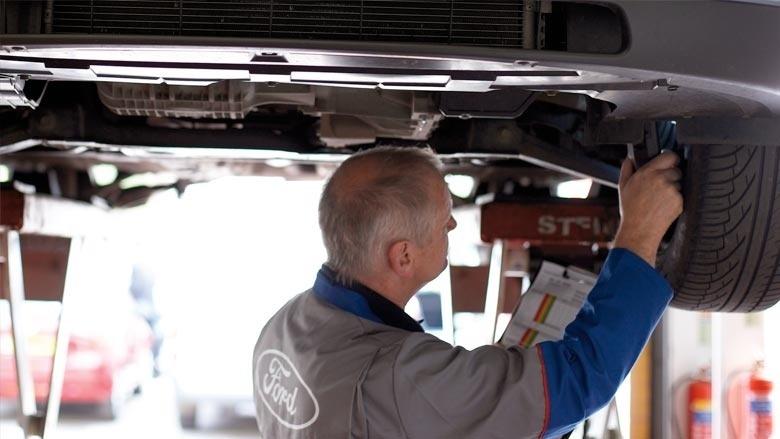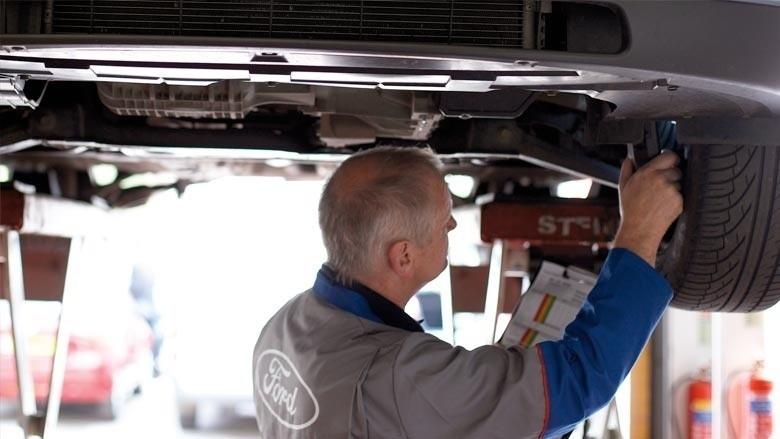[vc_row][vc_column][vc_column_text]
Why do we Accept Inefficiency in our Workshops

Photo Credit: Ford UK.
Why is it that some Service Managers focus on how little they can pay their technicians, yet rarely look at the opportunity cost associated with them standing at the back counter waiting for parts or fumbling around in a congested car park.
Regrettably many dealerships accept inefficient work practices, and have previously relied on increasing their labour rates, or upselling add-ons to attain their budgets.
With most manufacturers now moving towards capped price servicing, and focusing on fixed-right-first-time scores, such practices are no longer feasible, and as a result, many dealer’s bottom lines are suffering.
I recently visited a mainstream dealership and listened to a service advisor attempting to upsell a rotate and balance and a wheel alignment. Meanwhile, in the workshop I noticed a social gathering of technicians at the parts back counter, presumably waiting on their quotes for additional spare parts, or the indeed the parts themselves. Outside there was a congested car park, where I witnessed a technician wandering around clutching a remote key, holding it in the air and repeatedly pressing the remote in the hope they could identify the vehicle. Once found, they then had to return to service reception to find the keys for the two cars blocking this one in. All up, this technician spent around 15 mins getting their vehicle from the car park, to their work-bay, and then spent another 10 minutes at the parts back counter waiting for their parts.
I did some very quick mathematics and my findings were startling. If we consider conservatively that each technician spends 15 mins per job procuring the vehicle and the parts, and works on say four vehicles per day, then an hour of their day is wasted in time that could otherwise have been charged out at upwards of $135, or thereabouts. Then consider that there are 15 technicians working at this dealership, and all of a sudden, we’ve squandered $2,025 of labour that day, or $42,525 for the month. Granted, it’s unlikely we can eliminate this non-value added time altogether, but what if we could reduce it? Furthermore, what about the additional parts we sell, for every extra hour of labour we sell? This incremental labour isn’t a gross sales figure, it actually goes straight to the bottom line, since you’re already paying the technician’s wages.
Are manufacturers standard repair times unrealistic, or have we just accepted hundreds of inefficiencies associated with our current practices? The shrewd service manager will have already realized that survival means reducing every ounce of non-value added time from their workshop. This might mean employing parts runners to deliver parts to the technician’s bay, or vehicle-jockey’s to maintain an orderly carpark. It may include educating and training all involved in the importance of labour efficiency and recovery. Identifying any activity that acts as a road block and slows your technicians down. It’s also critical you employ technicians who understand your product, and can apply their experience in ensuring the most efficient rectification possible.
Extended service intervals mean less maintenance work and technological advancements mean more diagnostic work.When combined, efficient work practices and employment of highly skilled technicians has never been more important than it is today. Techs On The Move source technicians who are simply, ‘Plug and Play’, that is they’ll hit the ground running, know your product, and already possess the manufacturer training and experience you desire.
Now none of what I’ve written is rocket science, and most of this has been known since Adam was a boy, so why is it then that inefficient practices remain? I believe it comes down to the fact that having an efficient workshop is a culture, it takes years to cultivate, and requires that everyone is committed to it. There is no one silver bullet, but rather, a hundred small initiatives which when accumulated make the difference between those that will survive, and those dinosaurs who will become extinct, blaming the manufacturers for their unrealistic standard repair times, or capped price service initiatives.
Read our next post: How can I use my skills to find work in Australia?[/vc_column_text][/vc_column][/vc_row]
